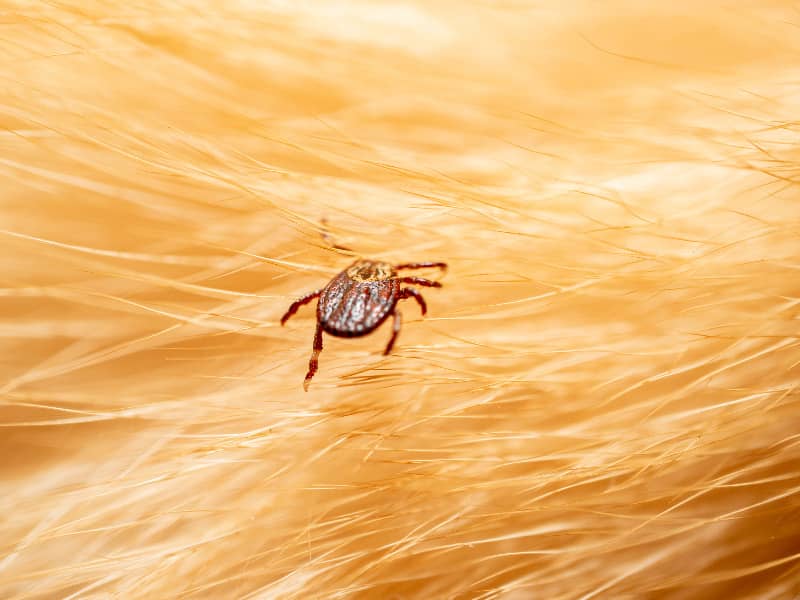
Rabbit ticks
Rabbits are not only cute and fluffy pets, but also complex creatures with their own needs and risks. One of those risks that is often overlooked is tick infestation. In this blog post, we'll explore the question of whether rabbits can get ticks, and what you can do about it.
- Rabbit ticks
- What are ticks?
- Can rabbits get ticks?
- Anatomy of a rabbit
- Habitat and ticks
- Tick species and rabbits
- How to recognize ticks in rabbits?
- Prevention of rabbit ticks
- Rabbit ticks treatment options
- Risks and side effects
- Myths and facts about rabbit ticks
- Tips for the tick season
- FAQ: Rabbit ticks
- Legal notice
- Conclusion: rabbit ticks
What are ticks?
Ticks are small, spider-like parasites that feed on blood. They can transmit a variety of diseases and therefore pose a serious risk to humans and animals. Ticks are found in many habitats, from forests and meadows to urban parks.
Why is the topic important?
A tick infestation is not only unpleasant for your rabbit, but can also have serious health consequences. Ticks can transmit diseases such as Lyme disease or TBE (early summer meningoencephalitis). Therefore, it is important to deal with the issue and take preventive measures.
What is covered in this blog post?
In this blog post you will learn everything you need to know to protect your rabbit from ticks. We'll look at rabbit anatomy, introduce the different types of ticks, and give tips on prevention and treatment. We will also dispel some myths and provide you with a comprehensive source of information on the subject.
Can rabbits get ticks?
The question of whether rabbits can get ticks is not only valid, but also of great importance to every rabbit owner. The answer is a resounding yes, and in the following sections you will learn how often this happens, what the risk factors are, and how you can protect your pet.
The short answer
Yes, rabbits can get ticks. Ticks are opportunistic parasites that are not very picky when it comes to their hosts. Although they are more common in dogs and cats, rabbits are not immune to being infested by these little bloodsuckers.
Frequency of occurrence
The likelihood of your rabbit getting ticks depends on several factors. These include the habitat, the time of year, and the overall health of the animal. Outdoor rabbits are generally more susceptible to tick infestation, especially during the warmer months when ticks are more active.
Risk factors
There are several risk factors that can increase the likelihood of a tick infestation in your rabbit. These include:
- Habitat: As mentioned earlier, outdoor rabbits are more susceptible to ticks.
- Season: Ticks are more active in spring and summer, which increases the risk.
- Rabbit health: A weakened immune system can make the animal more susceptible to parasites.
Anatomy of a rabbit
A rabbit's anatomy plays a critical role in how susceptible it is to ticks. In this section, we dive deep into the world of rabbit fur, skin, and other factors that can influence the risk of tick infestation.
Coat texture
Rabbits have thick, soft fur that not only helps them stay warm, but is also an ideal hiding place for parasites like ticks. The thick fur makes it difficult to detect ticks early, which reduces the likelihood of successful removal and treatment. Therefore, it is important to perform regular coat checks, especially if your rabbit spends time outdoors.
Skin structure
A rabbit's skin is relatively thin and sensitive, making it easier for ticks to bite and suck blood. This sensitive skin can also be more susceptible to infection, especially if a tick is not removed properly. It is therefore crucial to be extremely careful when removing ticks and to consult a veterinarian if in doubt.
Special vulnerabilities
Some rabbit breeds or individuals with certain health conditions may be more susceptible to ticks. Rabbits with weakened immune systems or skin problems, for example, may be at higher risk for tick infestation. The age of the rabbit may also play a role; young and very old rabbits are often more susceptible to parasites.
Habitat and ticks
Your rabbit's habitat can have a significant impact on how likely the animal is to get ticks. In this section, we look at the different habitats rabbits can live in and how they affect the risk of tick infestation.
Outdoor Rabbit
Rabbits that live outside are much more susceptible to tick infestation. This is because they are in direct contact with grass, bushes and other natural elements that serve as hiding places for ticks. If your rabbit leads an outdoor life, it's especially important to perform regular checks and use preventative measures like tick repellent.
Indoor rabbit
Rabbits that live indoors are generally less susceptible to ticks because they have less contact with tick-rich areas. However, that doesn't mean they are completely safe. Ticks can enter the home through front doors, windows, or even on the clothing and fur of other pets. Therefore, regular checks and preventative measures are also recommended for indoor rabbits.
Mixed forms
Some rabbits live both indoors and outdoors, depending on the season or the owner's preferences. These rabbits have a medium risk and need an adapted approach. For example, if your rabbit is only outside during the summer, you should be especially vigilant during this time and take preventative measures.
Tick species and rabbits
Not all ticks are the same, and some species pose a greater risk to rabbits than others. In this section, we will go over the different types of ticks that can be dangerous to your rabbit and how you can identify them.
Common wood tick
The common wood tick is the most widespread tick species in Germany and can transmit a number of diseases. This tick species is especially common in forests and tall grasses. If your rabbit has access to such areas, it is especially important to watch out for the common wood tick and take preventive measures.
Hedgehog tick
The hedgehog tick is another tick species found in Germany, but it transmits diseases less frequently. It is more common in urban areas and gardens. Even though the risk of disease transmission is lower, an infestation with hedgehog ticks should be taken seriously and treated.
Other tick species
There are also other tick species that are less common, but can still pose a risk. These include the riparian tick and the fox tick. These tick species are more likely to be found in specific geographic regions or under specific conditions. It is important to be aware of the tick species found in your area so that you can take appropriate precautions.
That was the section about the different types of ticks and their importance for rabbits. In the next section we will look at how to recognize ticks in rabbits and what you should do if your rabbit is infested with a tick.
How to recognize ticks in rabbits?
Recognizing a tick infestation in your rabbit is the first and most important step in treating and preventing further problems. In this section, you will learn what symptoms may indicate a tick infestation, how to safely remove ticks, and when a visit to the veterinarian is appropriate.
Symptoms
Tick infestation is often difficult to detect, especially in rabbits with thick coats. However, some signs may indicate it:
- Changed behavior such as restlessness or increased scratching
- Visible dark spots in the coat that can be identified as ticks on closer inspection
- Redness or swelling at the site where the tick bit
Tick removal
If you have discovered a tick on your rabbit, it is important to remove it as soon as possible. Special tick nippers or hooks are available for this purpose. The tick should be pulled out carefully and without twisting to ensure that the head does not get stuck. After removal, it is advisable to clean the area with an antiseptic agent.
When to the vet?
A visit to the veterinarian is recommended in the following cases:
- If you are unsure about how to remove the tick
- When the head of the tick gets stuck in the skin
- If signs of infection such as redness, swelling, or pus appear
- If your rabbit shows signs of a disease that can be transmitted by ticks, such as lethargy or fever

Prevention of rabbit ticks
Prevention is often the best way to protect your rabbit from the dangers of tick infestation. In this section you will learn more about the different methods of tick prevention, from tick repellents to environmental measures and regular checks.
Tick repellent
There are several tick repellents on the market specifically designed for rabbits. These range from spot-on drops to tick collars. It is important to choose a product that is safe for rabbits, as some products designed for dogs and cats may be toxic to rabbits. Always consult your veterinarian before trying a new product.
Environmental measures
The environment in which your rabbit lives can also play a role in preventing tick infestation. For outdoor rabbits, measures such as mowing the grass and removing leaves can be helpful. For indoor rabbits, it's important to clean the house regularly and make sure ticks can't get in through open windows or doors.
Regular controls
Whether your rabbit lives indoors or outdoors, regular checks are critical for early detection of a tick infestation. This includes carefully patting the fur and skin for signs of ticks. Special attention should be paid to the ears, neck and legs, as these are favorite spots for ticks.
Rabbit ticks treatment options
If your rabbit has been infested by a tick despite all precautions, it is important to know what treatment options are available. In this section, we will cover medications, natural remedies and veterinary care that can be considered for a tick infestation.
Medication
There are special medications that can be used to treat tick infestations in rabbits. These medications usually require a prescription and should only be used after consultation with a veterinarian. They can be administered in the form of tablets, sprays or spot-on drops and usually work quickly and effectively.
Natural means
For those who prefer a more natural approach, there are also some home remedies that can help treat tick infestations. These include coconut oil, apple cider vinegar and certain essential oils such as lavender or tea tree oil. However, it is important to note that the effectiveness of these remedies has not been scientifically proven and they should not be considered a substitute for professional veterinary treatment.
Veterinary care
In some cases, especially if the tick could not be completely removed or there are signs of infection, a visit to the veterinarian is essential. The veterinarian can professionally remove the tick and, if necessary, perform tests to determine if any diseases have been transmitted. In addition, he can prescribe special medications that are effective in treating and preventing tick infestations.
Risks and side effects
A tick infestation on your rabbit is not only unpleasant, but can also be associated with a number of risks and side effects. In this section, we will discuss the potential dangers, ranging from disease transmission to allergic reactions, as well as the long-term consequences of a tick infestation.
Rabbit ticks disease transmission
One of the greatest risks of tick infestation is the transmission of disease. Ticks can carry a variety of pathogens, including bacteria, viruses and protozoa. Diseases that can be transmitted by ticks include Lyme disease and TBE (early summer meningoencephalitis), both of which can have serious health consequences.
Allergic reactions
Some rabbits may be allergic to ticks or the substances they transmit. Symptoms of an allergic reaction may include itching, reddening of the skin and swelling. In extreme cases, breathing difficulties may even occur, which must be treated urgently by a veterinarian.
Long-term consequences
An untreated tick infestation can lead to long-term health problems. These include chronic skin infections, a weakened immune system and, in the worst case, systemic diseases. Therefore, it is important to detect and treat a tick infestation as early as possible to avoid long-term health problems.
Myths and facts about rabbit ticks
There are many myths and half-truths surrounding ticks and rabbits. In this section, we'll clear up some of the most common misconceptions and get the facts straight so you can be as informed as possible and effectively protect your rabbit.
Home remedy
A common myth is that home remedies such as garlic or lemon juice are sufficient to repel ticks. While some of these remedies may have some deterrent effect, they are not recommended as the sole preventive measure. Their effectiveness has not been scientifically proven, and they cannot eliminate the risk of disease transmission.
"Tick free" breeds
Sometimes you hear that certain breeds of rabbits are "tick resistant". This is a myth. All rabbits, regardless of breed, can get ticks. The risk may vary depending on habitat and health status, but no breed is completely immune to ticks.
Seasonal myths
Another myth is that ticks are only active in the warm months. Although ticks are indeed more active in the warmer months, they can also survive in mild winters and thus pose a risk all year round.
Tips for the tick season
Tick season presents a special challenge for rabbit owners. In this section, we'll give you some tips on how to prepare for tick season, common mistakes to avoid, and a contingency plan in case your rabbit is attacked by a tick.
Preparation
Preparation for tick season should begin early. This includes consulting a veterinarian to select the best tick repellent for your rabbit. It is also advisable to check your rabbit's habitat and remove possible tick hiding places such as tall grass or leaves.
Common mistakes
A common mistake is to assume that indoor rabbits are not at risk for tick infestation. As mentioned earlier, ticks can be present indoors and should not be underestimated. Another mistake is neglecting regular coat and skin checks, especially during tick season.
Emergency plan
It is always good to have an emergency plan in case your rabbit is infested with a tick. This plan should include your veterinarian's contact information, information about the nearest emergency veterinary clinic, and a list of supplies needed for tick removal, such as tick forceps and antiseptic.
FAQ: Rabbit ticks
Frequently asked questions are an important part of fully understanding the topic of ticks and rabbits. In this section, we answer some of the most frequently asked questions, provide brief answers, and link to further resources for more information.
Frequently asked questions
- Can all tick species transmit diseases?
- No, not all tick species are carriers of pathogens, but the risk is always there. Therefore, prevention is crucial.
- How often should I check my rabbit for ticks?
- During tick season, a daily check should be done, especially if your rabbit spends time outdoors. Otherwise, a weekly check is recommended.
- Can I use tick repellent for dogs and cats on my rabbit?
- No, many tick repellents for dogs and cats contain active ingredients that can be toxic to rabbits. Always consult a veterinarian before using a new product.
Short answers
- Are indoor rabbits safe from ticks?
- No, indoor rabbits can also get ticks, but the risk is much lower.
- What do I do if the head of the tick gets stuck?
- In this case, an immediate visit to the veterinarian is advisable to avoid infections.
Further resources
For more information, we recommend the websites of veterinarians, scientific studies on ticks and rabbits, and forums and blogs of rabbit owners who share their experiences.
Legal notice
When dealing with the topic of ticks and rabbits, there are also some legal aspects that should be considered. In this section we address liability, insurance and the importance of expert veterinary advice.
Liability
As a rabbit owner, you are responsible for the well-being of your pet. This includes protection against parasites such as ticks. If you neglect this duty, it may be considered cruelty to animals, which can have legal consequences.
Insurance
Some pet insurance policies also cover treatment in case of tick infestation. It is advisable to check the insurance conditions carefully and make sure that such cases are covered. This can save you high costs in case of emergency.
Expert veterinary advice
Although this blog post provides a comprehensive overview of the topic of ticks and rabbits, it is not a substitute for the advice of a qualified veterinarian. If you have any questions or concerns, you should always consult a veterinarian for a professional opinion and treatment.
Conclusion: rabbit ticks
Now that we've covered the topic "Can rabbits get ticks?" in detail, it's time for a summary and conclusions. In this section we summarize the most important findings and give you a checklist for the next steps.
Most important findings
- Yes, rabbits can get ticks whether they live indoors or outdoors.
- The rabbit's anatomy, especially coat and skin, play a role in susceptibility to ticks.
- Different tick species pose different risks, including disease transmission.
- Prevention is key, and there are several methods, from tick repellents to environmental measures.
- In the event of a tick infestation, there are several treatment options, from medications to natural remedies.
Prevention checklist
- Consult veterinarian: Discuss the best prevention and treatment strategy for your rabbit.
- Check habitat: Remove potential tick hiding places and perform regular checks.
- Choose tick repellent: Choose a tick repellent suitable for rabbits.
- Regular controls: Check your rabbit regularly for ticks, especially during tick season.
- Create emergency plan: Have all necessary information and materials ready in case of tick infestation.
With this information and tips, you are well equipped to effectively protect your rabbit from ticks and to act correctly in the event of an infestation. We hope this blog post has been informative and helpful to you. Stay alert and take good care of your rabbit!
Author

-
Garden animal - A life with nature
Welcome to my animal blog! My name is Dirk and I am happy to take you on my journey through the fascinating world of animals and gardening.
Born 54 years ago, I have had an insatiable curiosity for the animal world around me since childhood. Although I have moved professionally in other industries, my true passion has always been animals and nature. It is remarkable how a small garden has become such an important part of my life.
Many of my fondest memories are associated with the animals that share our home. Whether it's the curious squirrels that scurry across the trees in the morning, the colorful variety of birds that visit our feeders, or the busy bees and butterflies that pollinate our flowers, every moment with them is invaluable to me.
This blog is my contribution to share my experiences, discoveries and insights with like-minded people. Here I will share stories of unforgettable encounters with animals, give tips on gardening and creating wildlife-friendly habitats, and take you on my journeys through nature.
Thank you so much for being here!
Cordial,
Dirk aka garden animal
Last posts
- 27. February 2024PetsVeganes Hundefutter – Grün und Gesund?
- 18. January 2024ChickensOregano für Hühner
- November 27, 2023HamsterDiurnal hamsters
- November 24, 2023HamsterHamster hammock






